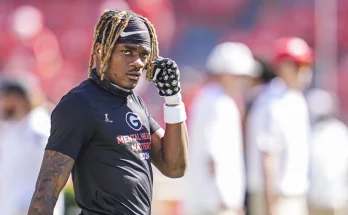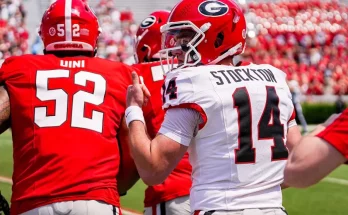When people talk about legendary college football coach Nick Saban, they often point to the unparalleled success he achieved on the gridiron: seven national championships, countless SEC titles, and a resume that solidified Alabama as the gold standard of college football for nearly two decades. But to truly understand Nick Saban’s greatness, one must look back further—to his roots in Fairmont, West Virginia, and more specifically, to the man who shaped the very core of his work ethic and leadership philosophy: his father, Nick Saban Sr., affectionately known as “Big Nick.”
In a rare and heartfelt 2019 interview, Terry Saban, Nick’s wife and closest confidante, offered deep insight into the man behind the myth. She shared how Big Nick’s influence molded her husband into the relentless, driven coach the world came to know. Her reflections not only humanized the iconic figure of Nick Saban but also revealed the powerful role of fatherhood, discipline, and legacy in shaping a leader who transformed college football.
Humble Beginnings in West Virginia
Nick Saban Jr. was born in 1951 in the small industrial town of Fairmont, West Virginia. Life was modest, and expectations were grounded in hard work, community, and family values. Saban’s father ran a service station and also coached a local Pop Warner youth football team. Big Nick didn’t just provide a living for his family—he provided a living example of discipline, leadership, and attention to detail.
Working at the service station wasn’t an option for young Nick—it was a requirement. “He learned responsibility early,” Terry Saban explained. “Big Nick didn’t believe in idle time. If you weren’t in school or on the field, you were expected to be working.”
That work ethic would follow Saban throughout his life. Changing oil, pumping gas, and managing customers at the station taught him not just the value of hard work but also people skills, punctuality, and a keen eye for operational excellence. It was Big Nick’s way of shaping his son’s worldview through consistent, deliberate routine.
Coaching Starts at Home
Big Nick’s influence extended beyond the service station and into the football field, where he coached youth football with an almost military precision. He demanded excellence, preached fundamentals, and had little tolerance for excuses. His team, the Monongah Lions, was a well-oiled machine that mirrored the ideals he instilled in his family: discipline, effort, and toughness.
“Big Nick had standards,” Terry shared. “And he didn’t lower them—not for anyone. I think that’s something Nick carried into his own coaching style.”
Saban’s meticulousness, his famed “process,” and his zero-defect mindset weren’t just born in college film rooms. They were forged in the crucible of youth football fields under the gaze of a father who expected greatness, even from 10-year-olds.
It was on those fields that Nick learned how to lead, how to correct mistakes, and how to get the best out of others. What he later refined under college coaches like Don James started with Big Nick’s grassroots program—a firm but loving foundation.
The Moment Everything Changed
Terry Saban recalled that Big Nick’s passing in 1973, during Nick’s first year of graduate school at Kent State, was a devastating and pivotal moment. It left a void—but also a calling.
“When Big Nick died, it was like Nick had to decide who he was going to be,” she said. “He could’ve chosen any path. But I feel like he had something to do with that, guiding Nick even after he was gone.”
That “something” was Big Nick’s enduring presence—a legacy of high standards, relentless preparation, and mental toughness. Saban could have pursued a business career or entered the workforce in some other capacity. Instead, he stayed at Kent State and began coaching under the watchful eye of Don James, one of the most influential mentors in Saban’s life. The discipline, structure, and methodology James instilled in his staff were strikingly similar to what Saban had seen in his own father.
This transition marked the beginning of Saban’s coaching career, and though Big Nick wasn’t there to see it unfold, his fingerprints were all over every step of the journey.
The Echoes of Big Nick in Nick Saban’s Coaching
To understand Nick Saban’s coaching philosophy is to hear echoes of his father’s voice in nearly every lesson. Big Nick’s expectations became the foundation for “The Process”—Saban’s now-famous philosophy that emphasizes preparation, execution, and daily improvement over outcome-based goals.
“If you don’t have high standards for yourself and those around you, you’re never going to reach your potential,” Saban has often said. It’s a sentiment that mirrors his father’s worldview.
Players who suited up for Saban at Alabama weren’t just coached—they were developed as men. That development process was often grueling, but the results spoke volumes. National championships, NFL careers, and a culture of excellence all stemmed from a mindset that Big Nick seeded in his son.
Even Terry noted how Nick brought those same expectations home. “He expects a lot—not just from players or coaches, but from everyone, including himself,” she said. “That’s Big Nick. That’s who he is deep down.”
A Legacy Beyond Football
The story of Big Nick is more than just a background tale to a legendary career. It’s a testament to the power of parenting, the weight of expectation, and the gift of discipline. It’s about a man who never lived to see his son become a football icon, but whose spirit lived on in every championship trophy and sideline lecture.
Terry Saban’s reflections painted a fuller picture of her husband—not as a stoic, emotionless figure but as someone profoundly shaped by love, loss, and legacy. She credited Big Nick not just for molding a coach but for anchoring a family and setting a standard that has echoed through generations.
In fact, many close to the Saban family have commented on how Nick carried Big Nick’s values into his own fatherhood. His children grew up with a man who never forgot the lessons he learned in Fairmont, who passed them on not just through words, but through action.
The Final Chapter at Alabama
When Nick Saban retired from coaching in early 2024, he left behind more than wins and titles. He left behind a blueprint for leadership that transcended football. Though media outlets scrambled to summarize his impact in numbers—win percentages, recruiting classes, NFL draft picks—those closest to him knew that the real story began and ended with his upbringing.
In that final press conference, when asked what kept him going all those years, Saban paused and mentioned his father. “I still hear his voice sometimes,” he said. “He’s been gone a long time, but in some ways, he never left.”
The Lasting Influence of Big Nick
The most influential figures in our lives aren’t always those we know the longest, but those who shape us most deeply. For Nick Saban, Big Nick was more than a father—he was the architect of his identity.
Terry Saban’s interview served as a powerful reminder of that legacy. In her words, Big Nick’s influence didn’t stop when he passed away—it lived on in every detail-oriented film session, in every practice rep done to perfection, in every young man who came through Alabama’s program and left better for it.
“I feel like he had something to do with that,” Terry said. And there is little doubt that he did.
From a small town in West Virginia to the pinnacle of college football, Nick Saban’s path was paved by a father who believed that excellence wasn’t just a goal—it was a standard. That belief became the cornerstone of a dynasty, and it all started with Big Nick.



